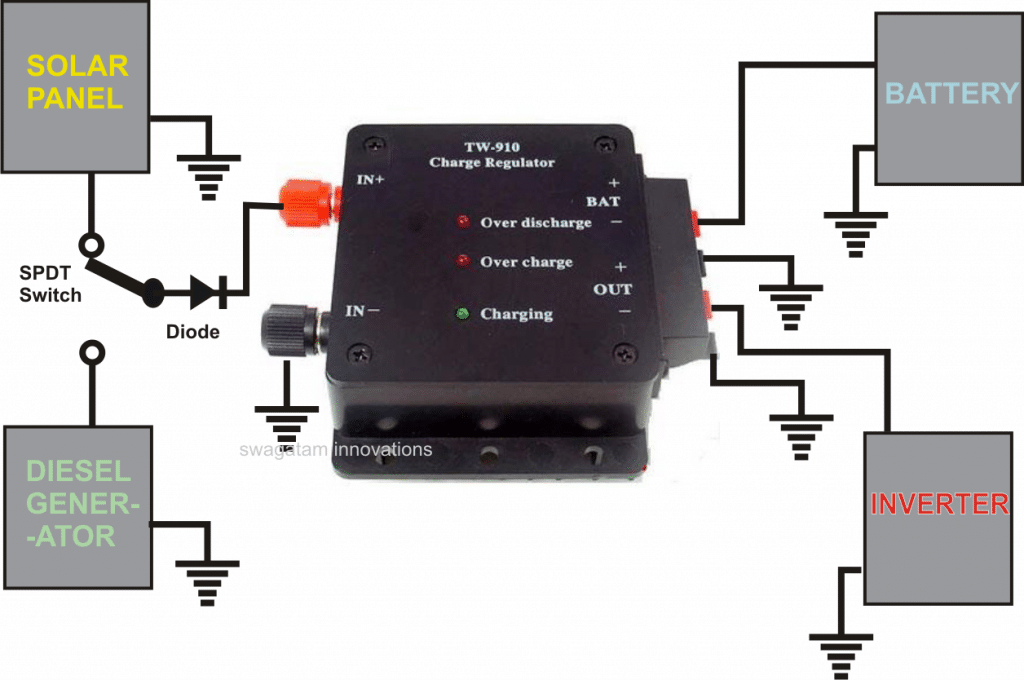The following page demonstrates, using calculations, how to properly pick and connect the solar panel, inverter, and charger controller combinations to achieve the best results from the configuration.
Understanding Solar Panel Inverter and Battery Charger Specifications
Imagine that you have some appliance or load that consumes about 100 watts and you want to run it using solar power for around ten hours every night without spending a dime on electricity.
To figure out exactly what size solar panel batteries charge controller and inverter you will need we have to carefully calculate and set up a few important parameters.
Estimating Load Wattage
First things first you need to figure out how many watts of electricity your specific load will require. So if we take that 100 watt load we mentioned earlier and say you want to use it for about 10 hours the total power you will need can be calculated by simply multiplying the load by the hours like this:
100 * 10 = 1,000 Watt hours. This number represents the total power you will need from your solar panel.
Determining Approximate Solar Panel Dimension
Next up we need to work out how big your solar panel should be in order to meet that power requirement we just calculated. Assuming you get about ten hours of good sunlight each day you can quickly figure out the specifications for your solar panel using this simple formula:
1,000 / 10 = 100 Watt solar panel.
But here is the thing during summer you might get those ten hours of decent sunlight but in winter you could only see around 4 to 5 hours of effective sunlight.
Considering this situation it makes sense to plan for the worst case scenario so that your load can keep running even when the sun is not shining as brightly. So if we take into account that 4 to 5 hours of sunlight per day we can recalculate the necessary power for the solar panel to ensure your load operates smoothly all year round.
1,000 / 5 = 200 Watt solar panel.
Calculating Battery Ah
Now that we have our solar panel size figured out it is time to calculate the amp hour rating for the batteries you will need to keep your specified load running under all conditions. Let’s say you choose a battery that is rated at 12 volts then you would do the following calculation:
You take 1,000 Watt hours and divide it by 12 Volts which gives you approximately 83 Amp Hours of battery capacity.
To be on the safe side let’s add a bit of extra tolerance here so rounding up with an additional 20 percent gives us a final figure of around 100 Amp Hours. Therefore what you will ultimately need is a 100AH battery rated at 12V for your inverter.
Evaluating Charger Controller Specifications
Next we need to determine how big your solar charge controller needs to be based on the calculations we have done so far. You will want to look at the current or amperage specifications for your solar panel which can easily be calculated by dividing the wattage rating of the panel by its voltage rating remember Ohm’s law?
So if we take our earlier example
100 / 12 = 8.3 Amps.
Since we have been generous with tolerances in our previous calculations let’s also give a little leeway here too instead of sticking strictly to that 8.3 amps limit why not bump it up to around 10 Amps? Sounds good right?
Assessing Inverter Specifications
Finally let’s wrap things up with figuring out what specifications your inverter should have so that it matches everything we have discussed and keeps your load running smoothly whenever needed.
Calculating inverter specs at this point is pretty straightforward since we already know that our maximum load wattage is 100 Watts which means we just need an inverter that can comfortably handle that amount.
So essentially what you are looking for is an inverter rated at 100 watts but hey if you want to add some extra tolerance here too instead of just sticking with the basic requirement you could opt for a slightly bigger inverter like one rated at 125 watts allowing all your devices to work together harmoniously keeping your home powered up around the clock without costing you anything at all!
